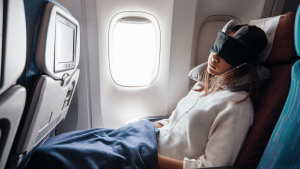Do you get jet lag when you fly? Here are some tricks to deal with it
Jet lag usually appears during latitudinal flights (east-west), and its intensity depends on the number of time zones crossed.
Anyone who has travelled between different time zones, for example from Warsaw to New York or Singapore, is well aware of the phenomenon of jet lag.
In short, it is a state in which our biological clock, after switching to a different time zone, does not allow us to immediately fully enjoy our rest after arrival.
What methods effectively help to avoid jet lag?
Jet lag – what is it?
Apparently, not all of us react to time zone changes in the same way. Most of us still feel tired a dozen or so hours after the trip, we have problems with concentration, headaches, and even migraines.
Petr Duchek – British Airways Commercial Manager for Central and Eastern Europe says: “Jet lag is manageable if you take the right steps to alleviate it. First of all, you should reduce stress before and during the trip, get enough sleep, and limit your alcohol and caffeine intake. It is also good to do some exercises before departure.”
Jet lag usually appears during latitudinal flights (east-west), and its intensity depends on the number of time zones crossed. Our bodies do not tolerate travel to the east as the day is shorter in this region. Flights to the West are tolerated much better by us. It turns out that we get used to longer days much more easily. Regardless of the direction we are flying, we should remember a few valuable tips.
Ways to deal with jet lag – sleep, sleep and more sleep
Let’s do everything we can to get a good night’s sleep before a long flight. Sleep is a key way to avoid jet lag. Setting off on a journey with a sleep deficit can result in both private and business trips being a failure due to poor well-being.
What’s more, if we are stressed before the journey and wake up in the middle of the night, it is best to go to bed a little later and get up earlier than usual to maintain continuity of sleep. Additional rest during the flight also helps to avoid fatigue after the journey. For this reason, British Airways introduced seats in First Class in 1996 that, at the touch of a button, change into fully reclining, exclusive beds.
In 2000, the carrier also introduced this solution to the Club World business class, which operates on all long-haul routes.
Jet lag relief tips – travel according to your biological clock
When there is a dissonance between the biological clock and real-time, we notice problems with falling asleep in a new time zone. Before departure, we can use a calculator that calculates the time difference and at the same time allows us to control Jet lag.
During the flights, it is worth using eye masks to help you fall asleep or turning on a lamp that imitates natural light, allowing you to enjoy the day when it is still night according to the new time zone.
Ways to deal with jet lag
Light food and simple physical exercise also help you adjust to the new time zone and avoid jet lag. Before the journey and during the flight, try to eat regular light meals, such as salads, fish or delicate white meat. After landing, eat according to the local time zone.
Before getting on the plane, you should also think about proper hydration. Altitudes promote water loss, so you should control the amount of coffee and alcohol you consume, and instead drink water, non-carbonated drinks and juices. Tomato juice works and tastes great on planes.


